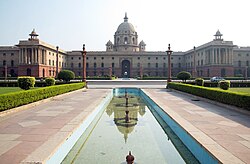User:Geordinia/sandbox6
Politics of Rajyaghar | |
|---|---|
 | |
| Polity type | Federal parliamentary constitutional monarchy |
| Constitution | Supreme Constitution |
| Legislative branch | |
| Name | Shahee Sansad |
| Type | Bicameral |
| Meeting place | Sansad Bhavan |
| Upper house | |
| Name | Council of States |
| Presiding officer | XX,, Adyaksh |
| Lower house | |
| Name | House of Representatives |
| Presiding officer | Devki Modhwadia,, Speaker |
| Executive branch | |
| Head of State | |
| Title | Monarch |
| Currently | Krishan VII |
| Appointer | Hereditary |
| Head of Government | |
| Title | Premier |
| Currently | Madhava Thakur |
| Appointer | Monarch |
| Cabinet | |
| Name | Ashta Pradhan |
| Current cabinet | Third Thakur Ministry |
| Leader | Premier |
| Appointer | Monarch |
| Judicial branch | |
| Name | Judiciary |
| Supreme Court | |
| Chief judge | Vishnu Kapadia |
| Seat | Nyaayik Mahal |
 |
|---|
| This article is part of a series on the politics and government of Rajyaghar |
The Politics of Rajyaghar works within the framework of the country's Constitution. Rajyaghar is a parliamentary representative democracy, a constitutional monarchy and a federal union in which the monarch of Rajyaghar is the head of state and the Premier of Rajyaghar is the head of government. The Constitution defines the institutional powers and limitations of both the Central Union Government and state governments; with it establishing a strong central authority, the federal government, at the centre with the states at the periphery. The Constitution is the supreme law with other conforming to its limitations.
Executive power is exercised by the Central Union Government, presided over by the Premier (Pradhānamantri) and Cabinet of Rajyaghar (Ashta Pradhan). The Premier and Cabinet are appointed by the Monarch on the advice of the legislature. Legislative power is vested in both the executive and the federal bicameral legislature (Shahee Sansad); consisting of an upper-un-elected chamber (Council of States) and lower-elected chamber (House of Representatives). Judicial power is exercised by members of the judiciary who are nominated by the executive, either federal or state, on the recommendation of the Independent Judicial Appointments Commission (IJAC). As a federal nation, some executive, legislative and judicial authority is delegated by the Constitution to state governments, legislatures and judiciaries.
Rajyaghar has a multi-party system, with three large national parties, and several other smaller regional political parties. Since the 1990s, no single party has held an absolute majority in the Shahee Sansad due to the electoral process and so political parties tend to opt for co-operation in order to form coalition governments and address issues. This has resulted in coalition governments becoming the norm with the formation of two major political alliances; National Progressive Alliance (left wing) and United Conservative Coalition (right wing). These alliances have resulted in coalitions that rarely span the political spectrum, resulting in divisions between the left and right political parties.
Since independence, Rajyani politics has been a class dividing affair with the upper classes often leading the political parties. Possible reasons for this could be the influence of clan, patriarchal and matriarchal leaders in Rajyani society, centralised power structures within political parties and economic demands of political parties in their operations and campaigns. Rajyaghar is generally regarded as a "flawed" or "southern democracy" due to this and the influence of unelected institutions such as the upper house of the federal parliament, military and Rajakumars.
Monarchy
The Rajyani Monarch, Maharaja Krishan VII has ruled as the head of staate of Rajyaghar since 10th April 1984. In accordance with the Rajyani Supreme Constitution, the monarch is the head of state and thus the source of all power and authority within the Rajyani realm. However, this power is delegated, via the Constitution and Acts of Parliament, to the Central Union Government, Shahee Sansad, Supreme Court and State administrations.
The Constitution outlines the specific powers delegated to the executive, judicial and legislative branches of the Rajyani Government, with all other powers being retained by the Monarch with them being exercised through the royal prerogative. However, since the late 1970s, many of these powers are exercised by the Monarch on the advice of the Government.
Today, the monarch's role is largely ceremonial with their authority mainly being exercised through influencing the Government and public opinion. Official duties and powers are exercised in accordance with the conventions of parliamentary democracy and seperation of powers. However, the Monarch continues to exercise the rights to be consulted, to advise and to warn. As a result, the Monarch holds weekly audiences with the Premier, hosts monthly meetings of the Ashta Pradhan, Military High Command and Shahee Sansad leadership, bimonthly meetings with the Consular Senate and bi-annual meetings of the Supreme Court.
According to the principles of constitutional monarchy, the monarch's role is largely ceremonial today, restricted in his or her exercise of power by the convention of parliamentary democracy and the separation of powers. However, the monarch does continue to exercise three rights: the right to be consulted; the right to advise; and the right to warn. Pursuant to these ideals, the Prime Minister and the Cabinet attend the regular meeting of the Council of State.
The Monarch and wider royal family still retain considerable influence across Rajyaghar. Culturally, the Monarch is the head of one of the largest clans in Rajyaghar and their actions are widely followed by the population. The Monarch and royal family also play a significant role in religion in Rajyaghar with the Monarch being the Lord Protector of Bishnupur, one of the holiest sites in the Ashram faith, and the Monarch also appoints, at their discretion, the Panditrao (High Priest) of Bishnupur, one of the pre-eminent leaders in the Ashram faith. The Monarch is also the Supreme Commander-in-Chief of the Armed Forces of Rajyaghar, with military personnel swearing oaths of allegiance to the Monarch and not to the Constitution. Whilst day-to-day administration of the armed forces is admdinistered by the civilian central union government, the Monarch has a significant role in overseas deployments and wider military policy. All senior members of the royal family have, and are expected to, complete officer training within one of the branches of the military and perform several years of military service.
The following powers are explicitly reserved for the Monarch in the Constitution:
- The power to dismiss and appoint a Premier and other Ministers
- The power to dismiss and appoint the High Priest of Bishnupur
- The power to legislate through Royal Decrees
- The power to summon and prorogue the Shahee Sansad
- The power to grant or refuse Royal Assent to bills (making them valid and law)
- The power to commission officers in the Armed Forces
- The power to command the Armed Forces of Rajyaghar
- The power to appoint members to the Judiciary
- The power to issue and withdraw passports
- The power to grant prerogative of mercy (pardons)
- The power to grant honours
- The power to create corporations via Royal Charter
- The power to ratify and make treaties
- The power to declare war and peace
- The power to recognise states
- The power to credit and receive diplomats
Executive
The Constitution states that all power, including that given to the Constitution, is derived from the Monarch, Krishan VII. Executive power is delegated from the Monarch to the Central Union Government (federal executive) and the Union State and Federal Territory administrations.
The Central Union Government performs the executive functions of the realm at the federal level. The affairs of government are decided by the Ashta Pradhan (Cabinet), headed by the Premier. The Ashta Pradhan and Premier are accountable to both the Shahee Sansad (Parliament) and Monarch with actions of the Central Union Government being authorised by either the Monarch or Parliament through Royal Prerogatives or Acts of Parliament respectively.
Members of the Ashta Pradhan are given the title of "Secretary of State" and each hold a different portfolio of government duties. The day to day role of Secretaries of State are to serve as head of one or more ministries, departments or secretariats within the Central Union Government. As they must be accountable to the Shahee Sansad, Secretaries of State must be members of the House of Representatives and the Government must always be able to maintain the confidence of the Shahee Sansad.
Head of government
The Premier is the head of the Rajyani federal government (Central Union Government). Unlike most other heads of government under the Northabbey model, the Premier of Rajyaghar is not considered primus inter pares. The Premier and members of the Ashta Pradhan are appointed by the Monarch on the basis that those appointed can command a majority in the Shahee Sansad. At the beginning of each new session of the Shahee Sansad, there is a Speech from the Throne made by the Monarch, written by the Government, after which the Government faces a vote of confidence in which it must pass in order to govern. The Shahee Sansad can also express a lack of confidence at any time in the Government which, if passed, would require the Premier and entire Ashta Pradhan to resign and the process of selecting a new Premier would begin in accordance with the Constitution and Acts of Parliament. If no individual is able to command a majority through the Premieral Ballot, the Monarch is authorised to dissolve the Shahee Sansad and call an early election.
The current government is the 3rd Thakur Cabinet, led by Madhava Thakur from the Rajyani Rashtriya Party. The government is a coalition government consisting of the RRP and the Udāramātāvāḍī (Liberals) with Arjun Misra of the LP serving as First Secretary of State. Thakur's third government was formed following the 2020 General Election in which the RRP/LP United Conservative Coalition (UCC) won a majority of seats in the House of Representatives. Thakur is the longest serving Premier in Rajyani history and has led the Central Union Government since his election win in 2010.
Since the 1990s, most governments have been coalition governments led by either the Rajyani Rashtriya Party or the Cooperative Party. Prior to the RRP-LP victory in the 2010 General Election, the CP had led the Central Union Government for 15 years under the leadership of Manas Gulati (1995-2000) and Ravi Sharma (2000-2010). The Sharma Government was voted out of office in the 2010 election with the UCC sweeping into federal and state governments in what became known as the Blue Wave.


